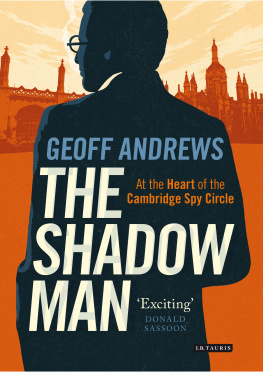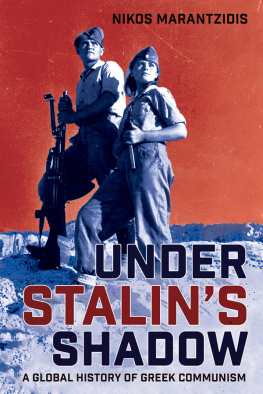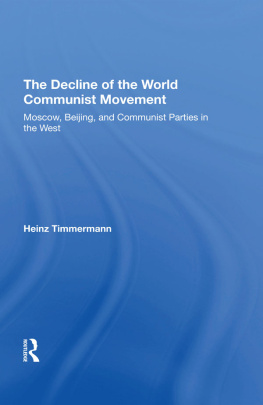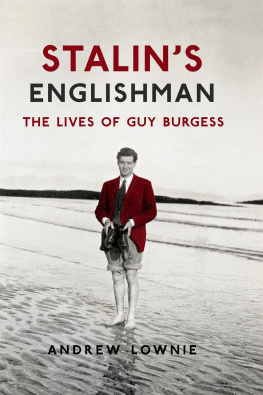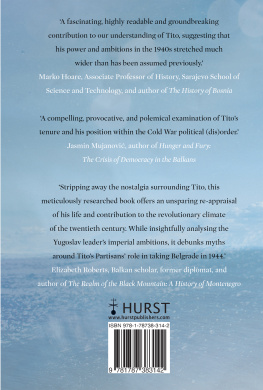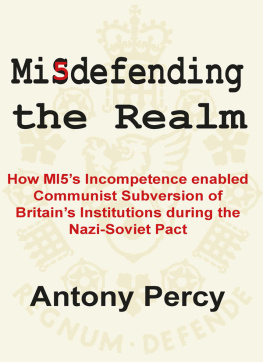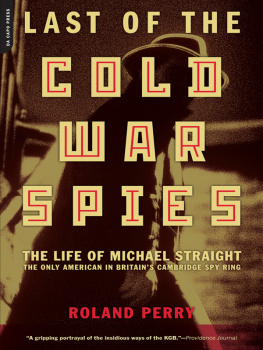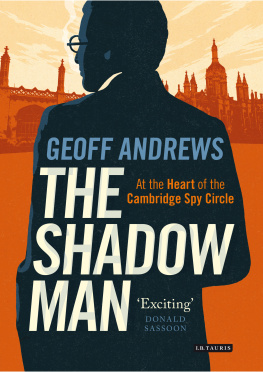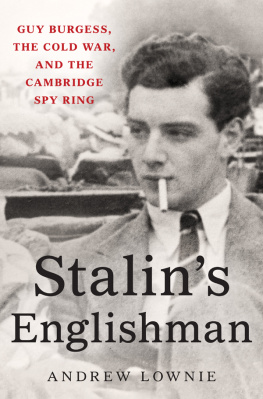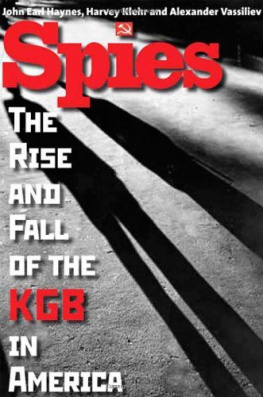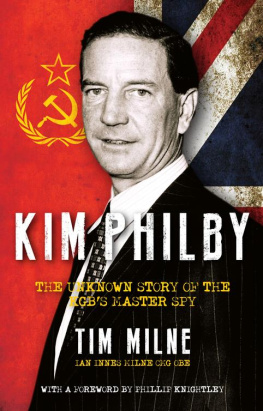Geoff Andrews is a writer and historian who specialises in the history of political ideas and movements. His previous books include The Slow Food Story: Politics and Pleasure ; Not a Normal Country: Italy After Berlusconi and Endgames and New Times: The Final Years of British Communism . He is Senior Lecturer in Politics at The Open University.
This quite unapologetic and exciting biography rescues James Klugmann from the condescension of posterity and from those of us who regarded him (mistakenly) as simply a dull British communist apparatchik. By strongly contextualising Klugmanns life, Geoff Andrews gives us a fuller picture of the man, an unswerving communist, a friend of the Cambridge spies, a recruit of Soviet intelligence, a senior SOE operative (under the nose of MI5), a great supporter of Tito before joining in Stalins fatwa, and, yes, also an ultra-loyalist communist hack.
Donald Sassoon, author of One Hundred Years of Socialism
Klugmann developed from the brilliant Cambridge undergraduate and student communist into a Stalinist intellectual, willing to denounce his former wartime comrades in the Yugoslav Communist Party. He can be an elusive quarry, and Geoff Andrews has done a fine job in piecing together the story. This fascinating biography illuminates the world of the mid-twentieth-century communist intellectuals: the idealism that motivated them, and the choices that they had to make.
Tom Buchanan, Professor of Modern British and European History, University of Oxford
THE SHADOW MAN
At the Heart of the Cambridge Spy Circle
Geoff Andrews

Published in 2015 by
I.B.Tauris & Co. Ltd
London New York
www.ibtauris.com
Copyright 2015 Geoff Andrews
The right of Geoff Andrews to be identified as the author of this work has been asserted by the author in accordance with the Copyright, Designs and Patents Act 1988.
All rights reserved. Except for brief quotations in a review, this book, or any part thereof, may not be reproduced, stored in or introduced into a retrieval system, or transmitted, in any form or by any means, electronic, mechanical, photocopying, recording or otherwise, without the prior written permission of the publisher.
Every attempt has been made to gain permission for the use of the images in this book. Any omissions will be rectified in future editions.
References to websites were correct at the time of writing.
ISBN: 978 1 78453 166 9
eISBN: 978 0 85773 956 8
A full CIP record for this book is available from the British Library
A full CIP record is available from the Library of Congress
Library of Congress Catalog Card Number: available
Typeset by JCS Publishing Services Ltd, www.jcs-publishing.co.uk
Contents
Illustrations
James Klugmanns father Samuel Klugmann (Marx Memorial Library)
Norman (as James was then known) and Kitty in 1917 (Mike Elliott)
James Klugmanns mother Cissie and his grandmother Martha (Marx Memorial Library)
Kitty Klugmann (Marx Memorial Library)
Punting on the River Cam while a student at Cambridge (Marx Memorial Library)
James Klugmann and Bernard Floud arrive in China on the World Student Association delegation (Courtesy of the Floud family)
Speaking at a student rally in China (Courtesy of the Floud family)
Kim Philbys memo to Roger Hollis after MI5 were alerted to Klugmanns SOE activities (The National Archives)
A communist at war (Marx Memorial Library)
At one of many Communist Party education schools. Klugmann is on the right, towards the back (Marx Memorial Library)
A good Jesuit? James Klugmann shortly before he died (Renzo Galeotti)
James Klugmann by Renzo Galeotti (Peoples History Museum, Manchester)
Acknowledgements
The book draws on James Klugmanns own extensive archive and papers, housed in the Marx Memorial Library, the Labour History Archive and Study Centre at the Peoples History Museum in Manchester, the School of Slavonic and East European Studies at University College, London and the Klugmann Collection at the University of Sheffield. I would like to thank Alan Powderly at the Marx Memorial Library for his help while he was cataloguing the Klugmann papers and subsequently Meirian Jump for permission to use photographs. Darren Treadwell at the Labour History Archive and Study Centre, at the Peoples History Museum in Manchester, has been very kind in arranging access to Klugmann material, held in its CPGB Archive, on several visits. The Eva Tas papers at the Social History Institute in Amsterdam provided an another important collection which detailed Klugmanns RME years in Paris, and I am grateful for the help from archivists during my visit.
I would like to thank Mike Fitzmaurice of The Hall School, Hampstead for making the schools archive available and arranging a visit to the school, as well as the permission to use James Klugmanns poem On the Lower Fourth Debating Society. Liz Larby at the Greshams School archive answered many queries and Simon Kinder, the schools history tutor, has been generous with his time and in sharing his own thoughts on James Klugmann and his Greshams cohort. I am indebted to Jonathan Smith, archivist at Trinity College, Cambridge, which holds the papers of several of Klugmanns contemporaries. Hannah Westall, archivist at Girton College, Cambridge, was very helpful in locating material on Kitty Klugmann.
Archivists at the Institute of Education and Goldsmiths College helped with the Brian Simon and Margot Heinemann collections, and thanks are also due to the librarians at The National Archives in Kew, the British Library, the Imperial War Museum, and the Bodleian Library, Oxford, for answering many queries.
I am grateful to Roderick Bailey for reading earlier draft chapters on Klugmanns SOE years. I would also like to thank Roderick Floud and Nicholas Deakin for inviting me to contribute to the Gresham College series Middle Class Recruits to Communism in the 1930s and to the Floud family for permission to use photographs from the China delegation in 1938. It has been a pleasure to talk about the politics of the 1930s with Jane Bernal and to hear more about her research on the life of her mother, Margot Heinemann.
I am grateful to the following for granting me interviews: Tom Bell, Joan Bellamy, the late Michael Barratt Brown, Mike Carter, the late Pete Carter, Henry Cook, the late John Earle, Roderick Floud, Renzo Galeotti, Julian Tudor Hart, the late Eric Hobsbawm, Martin Jacques, the late Grahame Locke, Linda Rene-Martin, Andreas Michaelides, Canon Paul Oestreicher, James Pettifer, Stephen Sedley, Michael Seifert, Jeff Skelley, Peter Stansky, Wolf Suschitzky and Conrad Wood.
The initial stages of my research benefited from the support of the Barry Amiel and Norman Melburn Trust. The Open Universitys Politics Department helped fund travel and archive visits as the book progressed.
The following provided various forms of help or suggestions: Sabrina Aaronovitch, Sasha Abramsky, Leighton Andrews, Sarah Benton, Tony Britten, David Burke, Peter J. Conradi, Sally Davison, Nicholas Deakin, Pat Devine, Mike Elliott, Hywel Francis, Juliet Gardiner, Gayle Gow, Nicholas Jacobs, Martin Kettle, Francis King, Andrew Lownie, David Margolies, Kevin Morgan, David Purdy, David Selbourne, Willie Thompson, Jason Toynbee and Richard Waterborn.
At I.B.Tauris, I would like to thank Jo Godfrey for her editorial input and for encouraging the book in its various stages and Jessica Cuthbert-Smith for copy-editing. Finally, Anita Sandhu thought James Klugmann an interesting character from early on and has helped in many ways.

